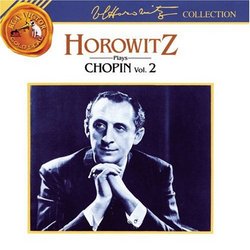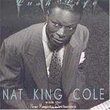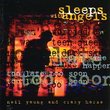| All Artists: Vladimir Horowitz Title: Horowitz Plays Chopin, Vol. 2 Members Wishing: 0 Total Copies: 0 Label: RCA Release Date: 4/5/1991 Genres: Dance & Electronic, Classical Styles: Forms & Genres, Ballads, Sonatas, Historical Periods, Modern, 20th, & 21st Century, Romantic (c.1820-1910) Number of Discs: 1 SwapaCD Credits: 1 UPC: 090266037629 |
Search - Vladimir Horowitz :: Horowitz Plays Chopin, Vol. 2
 | Vladimir Horowitz Horowitz Plays Chopin, Vol. 2 Genres: Dance & Electronic, Classical
|
Larger Image |
CD DetailsSimilar CDs
Similarly Requested CDs
|
CD ReviewsThe moment of the genuine pleasure M. OKAZAKI | Kochi, JAPAN | 09/13/2000 (5 out of 5 stars) "When I heard this version of "Funeral" at the classic branch of a music store, a stuff of its jazz section rushed here to ask what title this album has. I had already decided to buy it, surprising at its sound effects. It was the real story twenty years ago. This amazement would be re-presented even now.It is the young Horowitz that played this Funeral. He did never try to evoke the kind emotion, but simply to show the effect that the music has. It is the moment of the genuine pleasure to bring us the concentration of the consciousness on this sound and lead to the catharsis at last.This splendid masterpiece is lack of the repetition of the trio, according to his intention. It seems to him too quiet and kind to play twice.Once you hear this sound, you will never forget it all your life." Most Intensely Felt Ballade & Scherzo Scriabinmahler | UK | 10/24/2009 (4 out of 5 stars) "Sonata No.2 was recorded in was recorded in 1950. It sounds metalic and clattery. 1st movement is played at strangely measured tempo, quivering with nervous energy. Prest is electrifying, but overall his later stereo recording of the sonata on Sony is more compelling and refined.
Nocturne Op.9 No.2 and Op.55 No.1 is beautifully phrased and paced, with plenty of poetic feeling and breath-taking tonal shading. Impromptu No.1 suffers from background hiss, but the pianist's brilliance and subtlety still shine through. Etude Op.10 No.3 slightly suffers from distortion, but the performance itself is more poignantly felt than his later recordings. Etude No.4 is played with astonishing clarity and agility, if not as intense as Richter's breakneack-speed accounts of the piece. Although poorly recorded in 1947, I love this particular performance of Ballade No.1 for its urgency and the sense of inevitability in the build-up of emotional intensity. Scherzo No.1, recorded in 1951, is one of the most powerful and intensely felt accounts of the piece in Horowitz's entire discography, second only to Richter's devil-may-care accounts. " |

 Track Listings (12) - Disc #1
Track Listings (12) - Disc #1












